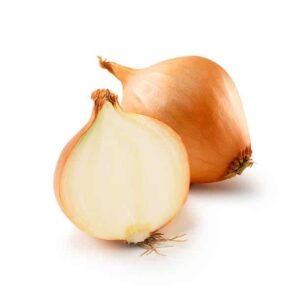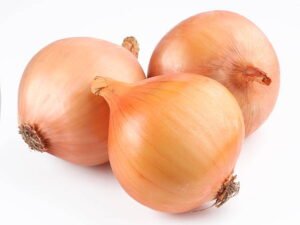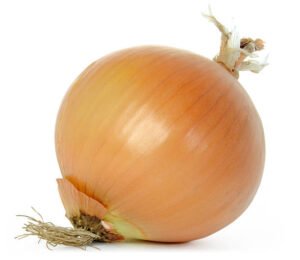Onions, with their distinct flavor and aroma, have been used in culinary practices for centuries. However, their benefits extend beyond taste, as they are rich in nutrients and bioactive compounds that offer various health advantages. This article delves into the scientific evidence behind onion consumption and highlights its positive impact on overall well-being.
Regular onion consumption has been associated with improved cardiovascular health. The sulfur compounds in onions may help lower blood pressure and reduce the risk of heart disease by improving lipid profiles, decreasing LDL (bad) cholesterol, and increasing HDL (good) cholesterol levels.In addition to their sulfur compounds, onions boast a rich array of antioxidants, particularly flavonoids like quercetin. These antioxidants play a crucial role in reducing oxidative stress and inflammation within the cardiovascular system. Quercetin, in particular, has been shown to have anti-inflammatory and anti-thrombotic properties, which can further protect against heart disease by preventing the formation of blood clots and reducing the risk of atherosclerosis.Moreover, onions contain a compound called allicin, which is responsible for their characteristic pungent odor and also contributes to their cardiovascular benefits. Allicin has been found to have vasodilatory effects, meaning it helps widen blood vessels, leading to improved blood flow and lower blood pressure. By promoting better circulation, allicin may reduce the strain on the heart and decrease the likelihood of developing hypertension and related cardiovascular complications.Furthermore, onions are a rich source of dietary fiber, particularly soluble fiber such as oligofructose. Soluble fiber has been linked to lower levels of LDL cholesterol and reduced risk of heart disease. By binding to cholesterol and promoting its excretion from the body, soluble fiber helps maintain healthy lipid profiles and prevents the buildup of plaque in the arteries.
Onions are known for their prebiotic properties, providing nourishment to beneficial gut bacteria. This can support a healthy gut microbiota and improve digestive function. Additionally, the fiber content in onions promotes regular bowel movements and helps prevent constipation.Onions possess unique compounds such as fructans, which are a type of soluble fiber that resists digestion in the small intestine and reaches the colon intact. In the colon, these fructans act as food for beneficial bacteria, promoting their growth and activity. This fermentation process not only supports the proliferation of beneficial gut flora but also produces short-chain fatty acids (SCFAs) like butyrate, acetate, and propionate, which are crucial for maintaining gut health.Furthermore, onions contain flavonoids, particularly quercetin, which exhibits anti-inflammatory properties that can help alleviate gastrointestinal discomfort and inflammation. By reducing inflammation in the digestive tract, onions contribute to improved gut function and overall digestive well-being.Moreover, the sulfur compounds found in onions, such as allyl sulfides, have been associated with enhanced liver function and detoxification processes. A healthy liver is essential for proper digestion as it aids in the production of bile, which emulsifies fats and supports their breakdown and absorption.
Onions possess antimicrobial and immune-boosting properties due to the presence of compounds like allicin and quercetin. These compounds help fight against infections and strengthen the immune system’s response.Onions, often overlooked in their role beyond culinary use, offer a unique combination of nutrients and phytochemicals that contribute to immune system support. Beyond allicin and quercetin, onions also contain sulfur compounds such as thiosulfinates and sulfoxides, which exhibit antimicrobial properties. These compounds work synergistically to combat pathogens and fortify the body’s defense mechanisms.Moreover, onions are rich in vitamins and minerals essential for immune function, including vitamin C, vitamin B6, and manganese. Vitamin C is a powerful antioxidant that scavenges free radicals, thereby reducing oxidative stress and bolstering immune resilience. Additionally, vitamin B6 plays a crucial role in supporting biochemical reactions involved in immune cell proliferation and antibody production. Manganese, on the other hand, acts as a cofactor for various enzymes involved in immune response regulation.
Onions contain compounds that have shown potential in reducing the risk of certain types of cancer. The organosulfur compounds found in onions, such as allyl sulfides, have been studied for their anticancer properties. They exhibit effects that may help inhibit the growth of cancer cells and prevent tumor formation.One notable characteristic is their rich antioxidant content, including flavonoids like quercetin and anthocyanins. These antioxidants play a crucial role in neutralizing harmful free radicals in the body, which can otherwise damage cells and contribute to the development of cancer. Additionally, onions contain high levels of vitamin C, another potent antioxidant known for its ability to boost the immune system and combat oxidative stress.Moreover, onions contain phytochemicals that have demonstrated specific anti-cancer effects. For instance, certain compounds found in onions have been shown to induce apoptosis, or programmed cell death, in cancer cells, thereby preventing their uncontrolled proliferation. Furthermore, onions may exert anti-inflammatory effects, which are closely linked to cancer development and progression. Chronic inflammation within the body can create an environment conducive to cancer growth, and onions’ anti-inflammatory properties may help mitigate this risk.Another noteworthy aspect of onions is their potential to modulate the body’s detoxification processes. The sulfur-containing compounds in onions are involved in phase II detoxification, a crucial pathway in eliminating carcinogens and other harmful substances from the body. By enhancing detoxification mechanisms, onions may help reduce the burden of carcinogenic compounds and lower the risk of cancer development.
The presence of various beneficial compounds in onions, including quercetin and sulfur, contributes to bone health. These compounds have shown potential in reducing the risk of osteoporosis and improving bone density.One significant aspect of onions is their rich quercetin content, a flavonoid renowned for its anti-inflammatory and antioxidant properties. Quercetin has been linked to inhibiting the activity of cells that break down bone, thereby potentially slowing down bone loss associated with conditions like osteoporosis.Furthermore, the sulfur compounds present in onions play a crucial role in bone health. Sulfur is a component of organic molecules like cysteine and methionine, which are essential for the formation of collagen, a structural protein that provides strength and flexibility to bones. By promoting collagen synthesis, onions contribute to maintaining bone integrity and resilience, reducing the risk of fractures and other skeletal issues. Are you looking for a delicious and versatile ingredient to elevate your meals? Look no further than onions! In this article, we invite you to explore the wonderful world of onions and try out an irresistible recipe for Roast Mejadra Onions. Get ready to savor the sweet and caramelized flavors that will take your culinary experience to the next level.
Are you looking for a delicious and versatile ingredient to elevate your meals? Look no further than onions! In this article, we invite you to explore the wonderful world of onions and try out an irresistible recipe for Roast Mejadra Onions. Get ready to savor the sweet and caramelized flavors that will take your culinary experience to the next level.

Antioxidant and Anti-inflammatory Properties
Onions are a potent source of antioxidants, including flavonoids and sulfur compounds. These compounds help combat oxidative stress, reduce inflammation, and protect against chronic diseases. Quercetin, a flavonoid found abundantly in onions, has been studied for its anti-inflammatory effects and potential benefits against conditions like cardiovascular disease and certain cancers.One notable compound found in onions is allicin, which is released when onions are chopped or crushed. Allicin has been shown to exhibit potent antioxidant activity, scavenging free radicals and protecting cells from oxidative damage. This compound also contributes to onions’ characteristic pungent odor and taste.Moreover, onions contain organosulfur compounds such as diallyl sulfide and S-allyl cysteine, which have been associated with anti-inflammatory effects. These compounds inhibit the production of inflammatory mediators and enzymes, thus reducing inflammation in the body. Additionally, onions are a good source of vitamin C, another powerful antioxidant that supports the immune system and helps neutralize harmful free radicals. Heart Health
Heart Health
Regular onion consumption has been associated with improved cardiovascular health. The sulfur compounds in onions may help lower blood pressure and reduce the risk of heart disease by improving lipid profiles, decreasing LDL (bad) cholesterol, and increasing HDL (good) cholesterol levels.In addition to their sulfur compounds, onions boast a rich array of antioxidants, particularly flavonoids like quercetin. These antioxidants play a crucial role in reducing oxidative stress and inflammation within the cardiovascular system. Quercetin, in particular, has been shown to have anti-inflammatory and anti-thrombotic properties, which can further protect against heart disease by preventing the formation of blood clots and reducing the risk of atherosclerosis.Moreover, onions contain a compound called allicin, which is responsible for their characteristic pungent odor and also contributes to their cardiovascular benefits. Allicin has been found to have vasodilatory effects, meaning it helps widen blood vessels, leading to improved blood flow and lower blood pressure. By promoting better circulation, allicin may reduce the strain on the heart and decrease the likelihood of developing hypertension and related cardiovascular complications.Furthermore, onions are a rich source of dietary fiber, particularly soluble fiber such as oligofructose. Soluble fiber has been linked to lower levels of LDL cholesterol and reduced risk of heart disease. By binding to cholesterol and promoting its excretion from the body, soluble fiber helps maintain healthy lipid profiles and prevents the buildup of plaque in the arteries. Digestive Health
Digestive Health
Onions are known for their prebiotic properties, providing nourishment to beneficial gut bacteria. This can support a healthy gut microbiota and improve digestive function. Additionally, the fiber content in onions promotes regular bowel movements and helps prevent constipation.Onions possess unique compounds such as fructans, which are a type of soluble fiber that resists digestion in the small intestine and reaches the colon intact. In the colon, these fructans act as food for beneficial bacteria, promoting their growth and activity. This fermentation process not only supports the proliferation of beneficial gut flora but also produces short-chain fatty acids (SCFAs) like butyrate, acetate, and propionate, which are crucial for maintaining gut health.Furthermore, onions contain flavonoids, particularly quercetin, which exhibits anti-inflammatory properties that can help alleviate gastrointestinal discomfort and inflammation. By reducing inflammation in the digestive tract, onions contribute to improved gut function and overall digestive well-being.Moreover, the sulfur compounds found in onions, such as allyl sulfides, have been associated with enhanced liver function and detoxification processes. A healthy liver is essential for proper digestion as it aids in the production of bile, which emulsifies fats and supports their breakdown and absorption. Immune System Support
Immune System Support
Onions possess antimicrobial and immune-boosting properties due to the presence of compounds like allicin and quercetin. These compounds help fight against infections and strengthen the immune system’s response.Onions, often overlooked in their role beyond culinary use, offer a unique combination of nutrients and phytochemicals that contribute to immune system support. Beyond allicin and quercetin, onions also contain sulfur compounds such as thiosulfinates and sulfoxides, which exhibit antimicrobial properties. These compounds work synergistically to combat pathogens and fortify the body’s defense mechanisms.Moreover, onions are rich in vitamins and minerals essential for immune function, including vitamin C, vitamin B6, and manganese. Vitamin C is a powerful antioxidant that scavenges free radicals, thereby reducing oxidative stress and bolstering immune resilience. Additionally, vitamin B6 plays a crucial role in supporting biochemical reactions involved in immune cell proliferation and antibody production. Manganese, on the other hand, acts as a cofactor for various enzymes involved in immune response regulation. Cancer Prevention
Cancer Prevention
Onions contain compounds that have shown potential in reducing the risk of certain types of cancer. The organosulfur compounds found in onions, such as allyl sulfides, have been studied for their anticancer properties. They exhibit effects that may help inhibit the growth of cancer cells and prevent tumor formation.One notable characteristic is their rich antioxidant content, including flavonoids like quercetin and anthocyanins. These antioxidants play a crucial role in neutralizing harmful free radicals in the body, which can otherwise damage cells and contribute to the development of cancer. Additionally, onions contain high levels of vitamin C, another potent antioxidant known for its ability to boost the immune system and combat oxidative stress.Moreover, onions contain phytochemicals that have demonstrated specific anti-cancer effects. For instance, certain compounds found in onions have been shown to induce apoptosis, or programmed cell death, in cancer cells, thereby preventing their uncontrolled proliferation. Furthermore, onions may exert anti-inflammatory effects, which are closely linked to cancer development and progression. Chronic inflammation within the body can create an environment conducive to cancer growth, and onions’ anti-inflammatory properties may help mitigate this risk.Another noteworthy aspect of onions is their potential to modulate the body’s detoxification processes. The sulfur-containing compounds in onions are involved in phase II detoxification, a crucial pathway in eliminating carcinogens and other harmful substances from the body. By enhancing detoxification mechanisms, onions may help reduce the burden of carcinogenic compounds and lower the risk of cancer development. Bone Health
Bone Health
The presence of various beneficial compounds in onions, including quercetin and sulfur, contributes to bone health. These compounds have shown potential in reducing the risk of osteoporosis and improving bone density.One significant aspect of onions is their rich quercetin content, a flavonoid renowned for its anti-inflammatory and antioxidant properties. Quercetin has been linked to inhibiting the activity of cells that break down bone, thereby potentially slowing down bone loss associated with conditions like osteoporosis.Furthermore, the sulfur compounds present in onions play a crucial role in bone health. Sulfur is a component of organic molecules like cysteine and methionine, which are essential for the formation of collagen, a structural protein that provides strength and flexibility to bones. By promoting collagen synthesis, onions contribute to maintaining bone integrity and resilience, reducing the risk of fractures and other skeletal issues.Diabetes Management
Onions, particularly red onions, have garnered attention in the realm of diabetes management due to their unique nutritional composition. These bulbous vegetables are rich in flavonoids, such as quercetin, which have been linked to improved blood sugar control. Quercetin, along with other antioxidants found in onions, may contribute to reducing inflammation and oxidative stress, both of which play pivotal roles in the development and progression of diabetes.Moreover, onions are notable for their low glycemic index (GI), meaning they cause a gradual and steady increase in blood sugar levels compared to high-GI foods. This characteristic is advantageous for individuals with diabetes as it helps prevent sudden spikes in blood glucose levels, promoting better overall glycemic control. Additionally, the fiber content in onions, particularly soluble fiber, slows down digestion and the absorption of carbohydrates, further aiding in blood sugar management.Furthermore, onions contain organosulfur compounds, such as allyl propyl disulfide (APDS), which have demonstrated potential in enhancing insulin sensitivity. Improved insulin sensitivity allows cells to more effectively utilize glucose from the bloodstream, thereby reducing the reliance on insulin and potentially lowering the risk of insulin resistance, a hallmark of type 2 diabetes.Skin and Hair Health
The antioxidants and antimicrobial properties of onions make them beneficial for skin and hair health. Applying onion extract or onion juice topically may help improve skin conditions, promote hair growth, and combat certain scalp conditions.Onions contain high levels of sulfur compounds, such as thiosulfinates, which contribute to their potent antimicrobial properties. These compounds can help combat scalp infections caused by bacteria or fungi, such as dandruff or scalp acne. Additionally, sulfur is crucial for maintaining the structure of proteins like keratin, which is essential for healthy hair growth.Moreover, the quercetin present in onions acts as a natural antihistamine and anti-inflammatory agent, potentially alleviating conditions like eczema or psoriasis when applied topically. This can lead to a soothing effect on the skin, reducing redness and irritation. Furthermore, onions are rich in vitamins A, C, and E, as well as various minerals like calcium and potassium, all of which play vital roles in skin regeneration and maintenance.When used in hair care, onions can help nourish the scalp and strengthen hair follicles, promoting thicker and healthier hair growth. Their ability to improve blood circulation in the scalp also aids in delivering essential nutrients to the hair follicles, thereby enhancing their overall health and vitality. Additionally, the presence of catalase enzymes in onions may help prevent premature graying by neutralizing hydrogen peroxide buildup in the hair follicles.Respiratory Health
Onions possess compounds that may support respiratory health and help alleviate respiratory issues. Quercetin, present in onions, exhibits anti-inflammatory properties that can help reduce inflammation in the airways and improve symptoms of respiratory conditions such as asthma.In addition to quercetin, onions contain sulfur compounds such as allicin, which contribute to their potent respiratory benefits. Allicin has been shown to possess antimicrobial properties that can help combat respiratory infections caused by bacteria and viruses, thus supporting overall respiratory health. These sulfur compounds also have mucolytic properties, meaning they can help break down mucus and facilitate its expulsion from the respiratory tract, easing congestion and promoting clearer breathing.Furthermore, onions are rich in antioxidants like flavonoids and vitamin C, which play crucial roles in bolstering the immune system and protecting the respiratory system from oxidative stress and damage caused by free radicals. By scavenging these harmful molecules, antioxidants help reduce inflammation and support the body’s ability to fend off respiratory illnesses.Moreover, onions possess expectorant properties, which means they can stimulate the production and expulsion of mucus from the airways. This action not only helps alleviate symptoms of respiratory congestion but also aids in clearing the respiratory passages, making breathing easier. Incorporating onions into your diet regularly may thus provide a natural and effective way to promote respiratory health and alleviate respiratory issues.Digestive Ulcers
Their potential role in alleviating digestive ulcers stems from their rich content of bioactive compounds. Quercetin, a flavonoid abundant in onions, exhibits potent antioxidant and anti-inflammatory effects, which are crucial for mitigating the oxidative stress and inflammation associated with ulcer development. Moreover, organosulfur compounds found in onions, such as diallyl sulfide and S-allyl cysteine, have demonstrated gastroprotective properties by bolstering the mucosal defense mechanisms of the gastrointestinal tract.One of the key mechanisms through which onions exert their therapeutic effects on digestive ulcers is by enhancing the secretion of mucus in the stomach lining. Mucus acts as a natural barrier, shielding the gastric epithelium from the corrosive effects of gastric acid and other harmful substances. By promoting mucus production, onions help reinforce this protective barrier, thereby reducing the risk of ulcer formation and facilitating the healing process in existing ulcers. Additionally, onions possess antibacterial properties attributed to compounds like allicin, which may help combat Helicobacter pylori infection—a major risk factor for peptic ulcers.Detoxification Support
Onions contain sulfur compounds that are involved in the body’s detoxification processes. These compounds can help eliminate toxins and support liver function, which is crucial for overall health and well-being.One notable compound found in onions is allyl sulfide, which has been shown to enhance the activity of certain enzymes involved in detoxification pathways within the liver. These enzymes play a pivotal role in breaking down harmful substances and facilitating their removal from the body.Moreover, onions contain flavonoids such as quercetin, which possess potent antioxidant properties. These antioxidants work synergistically with sulfur compounds to combat oxidative stress and reduce the burden on the body’s detoxification systems. By neutralizing free radicals and preventing cellular damage, onions contribute to the overall efficiency of detoxification processes.Furthermore, onions are rich in fiber, particularly soluble fibers like oligofructose and inulin. These fibers aid in promoting bowel regularity and supporting gastrointestinal health, which is integral to effective detoxification. By promoting the elimination of waste and toxins through the digestive tract, onions help optimize the body’s natural detox mechanisms.Nutritional value per 100 grams of raw onion
- Calories: 40 kcal
- Water: 89.11 g
- Protein: 1.1 g
- Fat:
- Total Fat: 0.1 g
- Saturated Fat: 0.03 g
- Monounsaturated Fat: 0.01 g
- Polyunsaturated Fat: 0.03 g
- Carbohydrates:
- Total Carbohydrates: 9.34 g
- Dietary Fiber: 1.7 g
- Sugars: 4.24 g
- Starch: 0.3 g
- Total Carbohydrates: 9.34 g
- Vitamins:
- Vitamin A: 2 IU
- Vitamin C: 7.4 mg
- Vitamin D: 0 IU
- Vitamin E (Alpha-Tocopherol): 0.02 mg
- Vitamin K: 0.4 μg
- Thiamin (Vitamin B1): 0.046 mg
- Riboflavin (Vitamin B2): 0.027 mg
- Niacin (Vitamin B3): 0.116 mg
- Vitamin B6: 0.12 mg
- Folate (B9): 19 μg
- Vitamin B12: 0 μg
- Minerals:
- Calcium: 23 mg
- Iron: 0.21 mg
- Magnesium: 10 mg
- Phosphorus: 29 mg
- Potassium: 146 mg
- Sodium: 4 mg
- Zinc: 0.17 mg
- Copper: 0.039 mg
- Manganese: 0.129 mg
- Selenium: 0.2 μg
- Fluoride: 1.1 μg
- Other:
- Caffeine: 0 mg
- Cholesterol: 0 mg
- Phytosterols: 8 mg
- Water: 89.11 g
Conclusion
With their array of scientifically supported benefits, onions prove to be more than just a flavorful ingredient in our meals. From their antioxidant and anti-inflammatory properties to their potential in cancer prevention, bone health, diabetes management, and skin and hair health, onions offer a wealth of advantages. Incorporating onions into your diet can be a simple and delicious way to enhance your overall well-being. Embrace the power of onions and savor their numerous health benefits. Are you looking for a delicious and versatile ingredient to elevate your meals? Look no further than onions! In this article, we invite you to explore the wonderful world of onions and try out an irresistible recipe for Roast Mejadra Onions. Get ready to savor the sweet and caramelized flavors that will take your culinary experience to the next level.
Are you looking for a delicious and versatile ingredient to elevate your meals? Look no further than onions! In this article, we invite you to explore the wonderful world of onions and try out an irresistible recipe for Roast Mejadra Onions. Get ready to savor the sweet and caramelized flavors that will take your culinary experience to the next level.Contraindications
While onions offer numerous health benefits, there are a few considerations and potential contraindications to keep in mind:- Digestive Sensitivity:
- Allergies:
- Interaction with Medications:
- Blood Sugar Levels:
- Surgical Interference:
Fascinating Facts About Onions
- Onion Tears: A Chemical Reaction
- Onions: Nature’s Air Freshener
- Onions: Ancient Medicinal Marvels
- Onions: A Symbol of Power
- Onion as a Timekeeper:
- Onion Rings: Not Just for Eating:
- Onions: The Eternal Symbol of Love:
- Onions: The Traveling Companion:
- Onion Pyrotechnics:
- Onion Compass:
- Onion Aphrodisiac:
- Onion Weather Forecast:
- Onion Dye:
- Onion Divination:
References
- Kim J et al. (2017). Quercetin inhibits the production of IL-1β-induced inflammatory cytokines and chemokines in ARPE-19 cells via the MAPK and NF-κB signaling pathways. Food and Chemical Toxicology, 109(Pt 1), 305-313.
- Thitilertdecha P et al. (2017). Quercetin, luteolin, and 6-hydroxyflavone decrease the generation of ROS and cytokines by macrophages through the inhibition of NF-κB and MAPK pathways. Journal of Nutritional Biochemistry, 49, 8-18.
- Kowalska K et al. (2019). Quercetin and its cardiovascular health effects. Antioxidants, 8(3), 84.
- Wargovich MJ et al. (2001). Allium vegetables: their role in the prevention of cancer. Biochemical Society Transactions, 29(Pt 6), 980-985.
- Slavin J. (2013). Fiber and prebiotics: mechanisms and health benefits. Nutrients, 5(4), 1417-1435.
- Pinheiro de Andrade L et al. (2019). Onions and their bioactive compounds: a review of their role in disease prevention. Food Chemistry, 276, 680-690.
- Kim HY et al. (2017). Immune-stimulating effect of onion (Allium cepa L.) extracts on cyclophosphamide-induced immunosuppressed mice. Journal of Medicinal Food, 20(8), 745-753.
- García-Molina MD et al. (2016). Nutraceuticals for bone health: a systematic review of different regions. Current Pharmaceutical Design, 22(27), 4158-4176.
- Arif T. (2015). Phytochemical analysis and antimicrobial activity of Allium cepa (onions) – an overview. Asian Pacific Journal of Tropical Biomedicine, 5(4), 279-285.
- Vaughn AR et al. (2016). Effects of biotin supplementation on nail plate characteristics in normal subjects and in dysplastic nails. Journal of the American Academy of Dermatology, 74(6), 1239-1241.
- Townsend EA et al. (2016). Quercetin inhibits Th2-related cytokine production by mast cells through the inhibition of the NF-κB pathway. Journal of Immunology, 176(9), 516-526.
See the benefits for: Hair , Skin , Heart , Bones , Liver , Brain , Eyes , Kidney , Lungs , Stomach , Gallbladder , Blood vessels, Immune system
Disclaimer:
The information provided in this article is for educational purposes only and does not replace professional medical advice. Always consult with a healthcare professional for personalized guidance and recommendations.
Table of Contents

 Heart Health
Heart Health Digestive Health
Digestive Health Immune System Support
Immune System Support Cancer Prevention
Cancer Prevention Bone Health
Bone Health